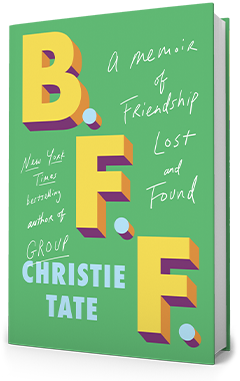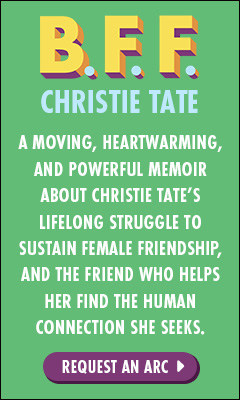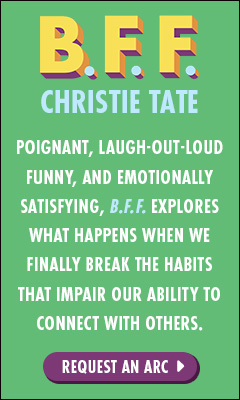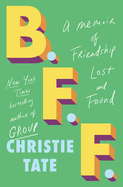B.F.F.: A Memoir of Friendship Lost and Found
by Christie Tate
Christie Tate, who bared it all in her therapy memoir Group: How One Therapist and a Circle of Strangers Changed My Life, lovingly and movingly turns her attention to the complications and joys of adult friendships in her second memoir, B.F.F.: A Memoir of Friendship Lost and Found. Her raw, intimate exploration of platonic connections between adults offers readers insights into what it takes to build--and maintain--a true relationship. Through the lens of an unexpected friendship with Meredith, a woman she meets in a recovery group, Tate peels back the layers of her own psyche to offer readers a raw, honest perspective on friendships and the formative role they play in every era of our lives. With Meredith as her "witness-partner-friend-guide," Tate moves from a place of believing she just isn't meant to have close friendships ("Meredith and I both believed that we simply weren't cut out for go-the-distance friendships with women") to a place of embracing the real, messy, joyous work of them.
She shows that work across the pages of B.F.F., writing with a sometimes stunning sense of vulnerability and deep introspection. (In the prologue, Tate writes, "Through [Meredith], I learned to tolerate the vagaries of friendship, address the pain of competition with and envy of other women, and confront the lie of my own unworthiness.") Tate's willingness to look inward and then share with the world that deeply personal thinking couches the emotional story of how two women found each other within the larger context of how doing so allowed them each to ultimately find themselves. The result is a memoir that ruminates on the many ways friendship shows up through the course of a life.
As she unpacks her lifelong issues with jealousy and doubt, recounting episodes of self-harm and addiction, Tate comes ever closer to the discovery that friendship is as complicated as life, and yet can be just as rewarding. She confides in Meredith her struggle with a triangulated friendship, and how it reminds her of other similar dynamics in three-way relationships; Meredith responds with stories of her own. "It was with Meredith's help that I'd learned how to be a friend," she writes. "A bona fide, true-blue, long-term, steady friend." That means accepting that each friendship comes with ups and downs, highs and lows--and that those are not a detractor of true friendships, but rather the making of them. This revelation feels at once so simple yet so complex, so obvious yet so hard to truly know, and Tate leaves the noticing up to readers, with all of the nuance implied within those contradictions.
It's also a recognition that comes crashing to the forefront of Tate's own life when Meredith is diagnosed with cancer several years into their still-nascent friendship. Feeling slightly insecure in the role she plays in Meredith's life (and vice versa), Tate finds herself unexpectedly invited in to Meredith's dying days: "Either I was mistaken to be surprised by my front row seat, or she'd mistakenly offered it to me." Tate does, for her, something different in this moment of pain and hardship in a friendship: she sticks around, owning her place in the chosen company of an impossible transition, accepting her inability to show up perfectly and instead determined to just show up. She sets aside her expectations of and desire for "intimate friendships without complications" and instead holds space for Meredith, for herself, for all of those grieving the end of a too-short life, in the days leading up to it and in the days following.
At some point in this march toward Meredith's death, Tate tells her she'd like to write their story--promising, at Meredith's request, "a happy ending." And while real life may not always mimic a fairy-tale happy ending--particularly as readers cry along with Tate through the stories of Meredith's last days--the growth Tate shows across the pages of this stirring account are the most realistic form of a happy ending: messy, chaotic and beautiful. "Tell them how we changed by holding each other's hand as we looked honestly at ourselves. Tell how one life can alter another." B.F.F. does just that, offering an intimate look at the friendship between these two women and how it shaped them both. And while it is unsurprising that Tate's memoir is focused particularly on friendships between adult women--given that both Tate and Meredith enter into their friendship as adult women--these lessons of personal growth, building community and showing up are applicable across ages and gender identities. B.F.F. is as tender and complex as the friendship stories it contains, a heartfelt exploration of mental health, holding space, and the great beauty to be found within the messy love between true friends. --Kerry McHugh








_Mary_Rafferty_Photography_crop.jpg)